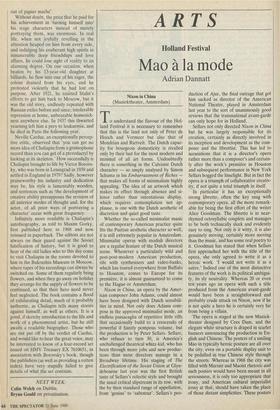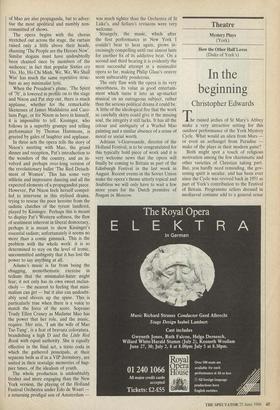ARTS
Holland Festival
Mao a la mode
Adrian Dannatt
Nixon in China (Muziektheater, Amsterdam)
To understand the flavour of the Hol- land Festival it is necessary to remember that this is the land not only of Peter de Hooch and Vermeer but also that of Mondrian and Rietvelt. The Dutch capac- ity for bourgeois domesticity is rivalled only by their lust for the most modern and minimal of all art forms. Undoubtedly there is something in the Calvinist Dutch character — so amply analysed by Simon Schama in his Embarrassment of Riches that makes all forms of minimalism highly appealing. The idea of an artwork which makes its effect through absence and si- lence rather than ostentatious display, which requires contemplation not ap- plause, is one with the Dutch aesthetic of discretion and quiet good taste.
Whether the so-called minimalist music of contemporary American practice quite fits the Puritan aesthetic character so well, it is still extremely popular in Amsterdam. Minimalist operas with modish directors are a regular feature of the Dutch musical scene. Whenever a particularly wild and post-post-modern American production, rife with synthesisers and video-banks, which has toured everywhere from Buffalo to Houston, comes to Europe for its premiere, it is almost guaranteed to come to the Hague or Amsterdam.
Nixon in China, an opera by the Amer- ican composer John Adams, could almost have been designed with Dutch sensibili- ties in mind. Not only does Adams com- pose in the approved minimalist mode, an endless passacaglia of repetitive little riffs that occasionally build to a crescendo of powerful if faintly pompous volume, but the production is by Peter Sellars. Sellars, who refuses to turn 30, is America's unchallenged theatrical whizz-kid, who has been through more jobs and new produc- tions than most directors manage in a Broadway lifetime. His staging of The Electrification of the Soviet Union at Glyn- debourne last year was the first British taste of Sellars's eclectic style and brought the usual critical slipstream in its tow, with the by then standard range of appellation, from 'genius' to 'saboteur'. Sellars's pro- duction of Ajax, the final outrage that got him sacked as director of the American National Theatre, played in Amsterdam last year to the sort of unanimously good reviews that the transnational avant-garde can only hope for in Holland.
Sellars not only directed Nixon in China but he was largely respOnsible for its creation, certainly as directly involved in its inception and development as the com- poser and the librettist. This has led to accusations that it is a director's opera rather more than a composer's and certain- ly after the work's premiere in Houston and subsequent performance in New York Sellars hogged the limelight. But in fact the opera is a triumph of collaborative creativ- ity, if not quite a total triumph in itself.
In particular it has an exceptionally strong libretto, often the key snag with contemporary opera, all the more remark- able for being the first effort of the writer Alice Goodman. The libretto is in near- rhymed octosyllabic couplets and manages to be both technically sleek and evidently easy to sing. Not only is it witty, it is also genuinely moving, certainly more moving than the music, and has some real poetry to it. Goodman has stated that when Sellars first approached her with the title of the opera, she only agreed to write it as a heroic work. 'I would not write it as a satire.' Indeed one of the most distinctive features of the work is its political ambigui- ty, its sly neutrality. Whereas 20 or even ten years ago an opera with such a title produced from the American avant-garde would have been a straightforward and probably crude attack on Nixon, now if he is not quite a hero he is certainly very far from being a villain.
The opera is staged at the new Muziek- theater designed by Cees Dam, and the elegant white structure is draped in scarlet banners announcing the production in En- glish and Chinese. The posters of a smiling Mao in typically heroic posture are all over the city, even on a portable display unit to be pedalled in true Chinese style through the streets. Whereas in 1968 the city was filled with Marxist and Maoist rhetoric and such posters would have been meant in all seriousness, it is only too appropriate that irony, and American cultural imperialist irony at that, should have taken the place of those distant simplicities. These posters of Mao are also propaganda, but to adver- tise the most apolitical and numbly non- committed of shows.
The opera begins with the, chorus stretched out across the stage, the curtain raised only a little above their heads, chanting 'The People are the Heroes Now'. Similar slogans must have undoubtedly been chanted once by members of the audience; in fact that popular Sixties cry 'Ho, Ho, Ho Chi Minh, We, We, We Shall Win' has much the same repetitive struc- ture as any minimalist lyric.
When the President's plane, 'The Spirit of '76', is lowered in profile on to the stage and Nixon and Pat step out, there is much applause, whether for the remarkable likenesses of James Maddalena and Caro- lann Page, or for Nixon as hero in himself, it is impossible to tell. Kissinger, who follows in a superbly grumpy and telling performance by Thomas Hammons, is greeted by gales of laughter and applause.
In three acts the opera tells the story of Nixon's meeting with Mao, the grand dinner and reception, Pat's introduction to the wonders of the country, and an in- volved and perhaps over-long version of the revolutionary ballet 'The Red Detach- ment of Women'. This has some very athletic and impressive dancing and all the expected elements of a propagandist piece. However, Pat Nixon feels herself compel- led to intervene in this stylised drama, trying to rescue the poor heroine from the sadistic clutches of the tyrant landlord, played by Kissinger. Perhaps this is meant to display Pat's Western softness, the flaw of sentiment inherent in liberal demOcracy, perhaps it is meant to show Kissinger's essential sadism; unfortunately it seems no more than a comic gimmick. This is the problem with the whole work: it is so determined to stay on the level of ironic, uncommitted ambiguity that it has lost the power to say anything at all.
Adams's music is far from being the chugging, monothematic exercise in tedium that the minimalist-hater might fear; it not only has its own sweet melan- choly — the nearest to feeling that mini- malism can get — but it also can undoubt- ably send shivers up the spine. This is particularly true when there is a voice to match the force of the score. Soprano Trudy Ellen Craney as Madame Mao has the power that her role, and the music, require. Her aria, 'I am the wife of Mao Tse-Tung', is a feat of bravura coloratura, brandishing a high D and the Little Red Book with equal authority. She is equally effective in the final act, a triste coda in which the gathered principals, at their separate beds as if in a VIP dormitory, are united in their nostalgic memories of hap- pier times, of the idealism of youth.
The whole production is undoubtably fresher and more engaging than the New York version, the playing of the Holland Festival Orchestra under Edo de Waart a returning prodigal son of Amsterdam — was much tighter than the Orchestra of St Luke's, and Sellars's revisions were very welcome.
Strangely, the music, which after the first performance in New York I couldn't bear to hear again, grows in- creasingly compelling until one almost lusts for another fix of its addictive beat. On a second and third hearing it is evidently the most successful attempt at a minimalist opera so far, making Philip Glass's oeuvre seem unbearably ponderous. The only flaw with the opera is its very smoothness, its value as good entertain- ment which turns it into an up-market musical on an outrageous subject, rather than the serious political drama it could be. A little of the ideological fire that the work so carefully skirts could give it the missing soul, the integrity it still lacks. It has all the colour and ambiguity of a Warhol Mao painting and a similar absence of a sense of moral or social worth.
Adriaan 's-Gravesande, director of the Holland Festival, is to be congratulated for this typically bold piece of work and it is very welcome news that the opera will finally be coming to Britain as part of the Edinburgh Festival in the last week in August. Recent events in the Soviet Union make'the opera's theme utterly topical and doubtless we will only have to wait a few more years for the Dutch premiere of Reagan in Moscow.











































































 Previous page
Previous page